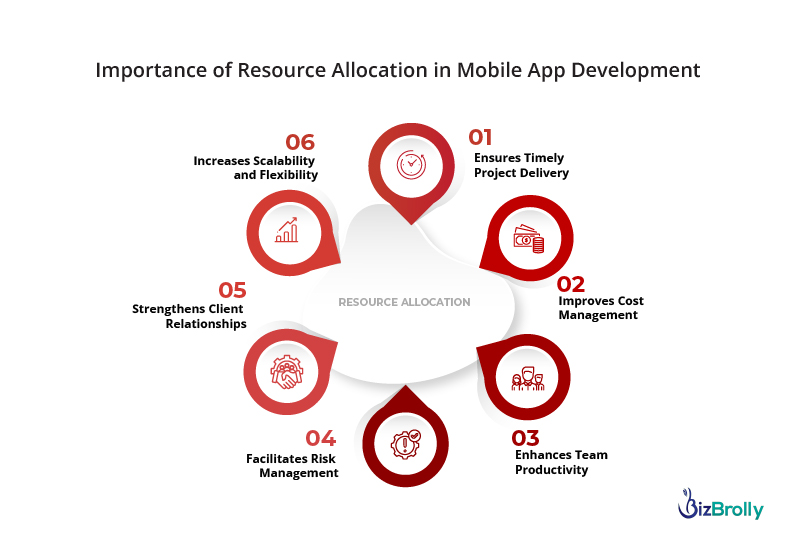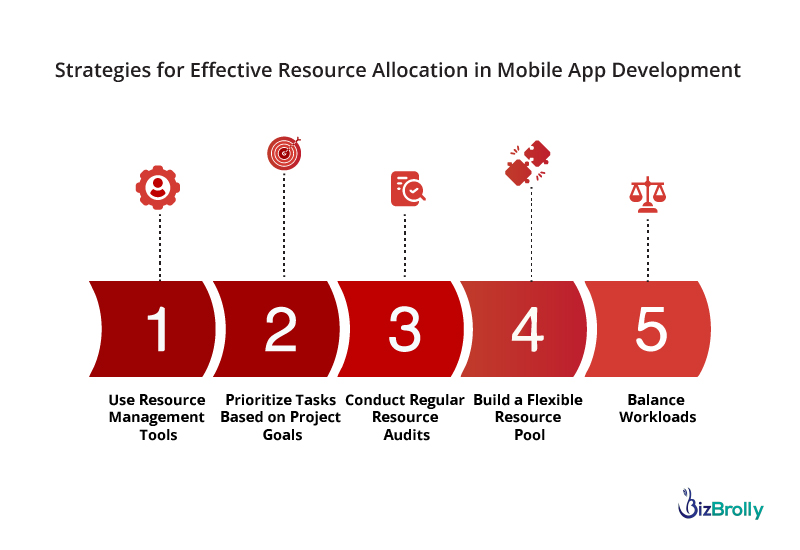Why resource allocation is crucial for mobile app development company


In today’s highly competitive digital landscape, mobile app development companies must optimize their resources to deliver high-quality apps efficiently. Proper resource allocation plays a pivotal role in ensuring that projects are completed on time, within budget, and with superior results. This blog explores why resource allocation is crucial for mobile app development companies and offers a comprehensive guide to improving resource management strategies.
Resource allocation refers to the strategic process of assigning the right resources, including personnel, tools, budget, and time, to various tasks within a project. For mobile app development companies, efficient resource allocation is the key to achieving optimal performance, ensuring timely project delivery, and maintaining quality standards. With the growing demand for mobile applications, companies must carefully manage their resources to meet client expectations while staying competitive in a fast-evolving market.
The significance of resource allocation goes beyond project timelines. It directly influences cost management, team productivity, risk mitigation, and overall scalability. By adopting effective resource management practices, companies can streamline their workflows, reduce operational inefficiencies, and enhance client satisfaction. This blog dives deep into the importance of resource allocation and provides actionable strategies for mobile app development companies to implement.
Efficient resource allocation ensures that the right people, tools, and technologies are used optimally to achieve project goals. Below, we explore several critical aspects of why resource allocation is a fundamental part of mobile app development.
 Ensures Timely Project Delivery
Ensures Timely Project DeliveryTimely delivery is crucial for mobile app development companies, as delays can lead to client dissatisfaction and lost revenue. Resource allocation helps in:
Example Table: Impact of Poor vs. Proper Resource Allocation on Project Timelines

Resource allocation is closely tied to financial planning. Mismanagement can lead to budget overruns, while efficient allocation can optimize costs.
According to a study by PMI (Project Management Institute), 11.4% of investment is wasted due to poor project performance, largely due to ineffective resource allocation.
Effective resource allocation boosts team productivity by ensuring that each team member works on tasks aligned with their expertise.
Proper resource allocation includes risk assessment and management. By analyzing project needs and potential risks, companies can allocate resources more strategically.
Clients appreciate timely delivery and quality results. Efficient resource allocation helps mobile app development companies meet client expectations, leading to stronger relationships and repeat business.
Proper resource allocation ensures that companies can scale operations and adapt to changing project requirements without sacrificing quality.
To achieve optimal resource allocation, mobile app development companies must implement strategies that enhance planning, monitoring, and optimization.

Modern resource management tools streamline allocation processes by providing insights into resource availability, skills, and workloads.
Popular Tools: Jira, Trello, Asana, Monday.com
Key Features: Task tracking, workload balancing, project reporting

Prioritizing tasks ensures that essential components of the app are developed first, minimizing risks and ensuring timely delivery.
Regular audits help identify inefficiencies and adjust resource allocation accordingly.
Having a flexible pool of resources ensures that companies can adapt to changing project needs without major disruptions.
Balancing workloads prevents burnout and ensures that team members remain productive and motivated.
Agile development has become the standard approach for many mobile app development companies. In this environment, resource allocation is even more critical due to the iterative and dynamic nature of Agile projects.
In Agile development, work is divided into sprints. Proper resource allocation ensures that the right resources are assigned to each sprint to achieve goals efficiently.
Agile projects often require cross-functional teams with diverse skill sets. Proper resource allocation ensures that these teams have the necessary resources to succeed.
Resource allocation helps manage dependencies between different tasks and teams, which is crucial in Agile development.
Agile emphasizes continuous improvement. Regular resource reviews ensure that resource allocation strategies evolve with project needs.
Agile projects often encounter changing requirements. Flexible resource allocation allows teams to adapt quickly.
Tracking metrics is essential to ensure that resource allocation strategies are effective.
Resource allocation is a critical factor in the success of mobile app development companies. By ensuring that resources are used efficiently and effectively, companies can improve project delivery, enhance productivity, and strengthen client relationships. Implementing robust resource allocation strategies and using modern management tools can help companies stay competitive in the ever-evolving mobile app development industry.
To remain successful in a fast-paced digital world, mobile app development companies must view resource allocation not just as a process but as a continuous improvement strategy. By aligning resources with project goals, prioritizing key tasks, and leveraging technology, companies can achieve long-term success and client satisfaction.

In recent years, artificial intelligence (AI) has rapidly advanced, with neural ...
Explore more
Cloud computing is transforming the manufacturing industry by making it easier t...
Explore more


D-23, Sector 63, Noida,
UP - 201307

141 Westgate Dr, Edison,
NJ - 08820

4 Black lion court, Mill road, Kent, UK – ME71HL

2207, 2220 Lakeshore Blvd W, Toronto ON- M8V0C1

94A Central Road, Jacanlee, Johannesburg 2194